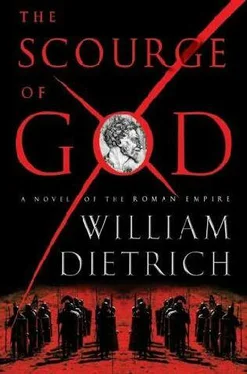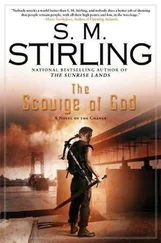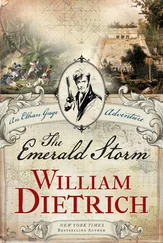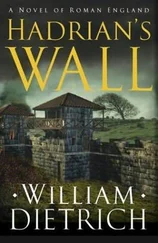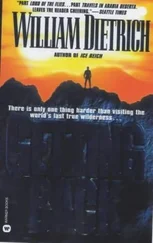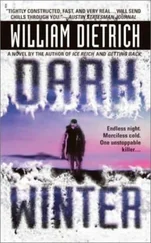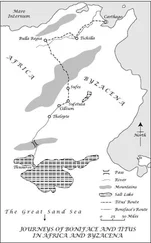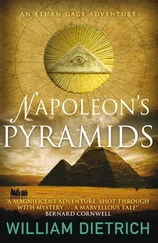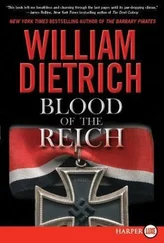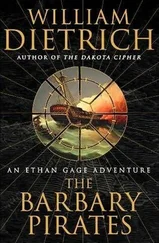William Dietrich - The Scourge of God
Здесь есть возможность читать онлайн «William Dietrich - The Scourge of God» весь текст электронной книги совершенно бесплатно (целиком полную версию без сокращений). В некоторых случаях можно слушать аудио, скачать через торрент в формате fb2 и присутствует краткое содержание. Жанр: Фэнтези, на английском языке. Описание произведения, (предисловие) а так же отзывы посетителей доступны на портале библиотеки ЛибКат.
- Название:The Scourge of God
- Автор:
- Жанр:
- Год:неизвестен
- ISBN:нет данных
- Рейтинг книги:5 / 5. Голосов: 1
-
Избранное:Добавить в избранное
- Отзывы:
-
Ваша оценка:
- 100
- 1
- 2
- 3
- 4
- 5
The Scourge of God: краткое содержание, описание и аннотация
Предлагаем к чтению аннотацию, описание, краткое содержание или предисловие (зависит от того, что написал сам автор книги «The Scourge of God»). Если вы не нашли необходимую информацию о книге — напишите в комментариях, мы постараемся отыскать её.
The Scourge of God — читать онлайн бесплатно полную книгу (весь текст) целиком
Ниже представлен текст книги, разбитый по страницам. Система сохранения места последней прочитанной страницы, позволяет с удобством читать онлайн бесплатно книгу «The Scourge of God», без необходимости каждый раз заново искать на чём Вы остановились. Поставьте закладку, и сможете в любой момент перейти на страницу, на которой закончили чтение.
Интервал:
Закладка:
“Who was that?” Aetius asked curiously.
“A friend,” I replied without thinking, and surprised myself by what I said. But who better understood me than the man who wanted Ilana for himself? Who more intimately shared my experiences than the man I’d battled so often?
Aetius frowned at my reply, regarding me a moment as if it were the first time he had really seen me and wanted to lodge this curious sight in his memory. Then he nodded to Zerco, and the dwarf waddled forward, almost staggering under the weight of Attila’s great sword of Mars strapped to its pole. The general leaned to take it and then, the muscles of his arm straining, he lifted the weapon as high overhead as he could. Ten thousand faces swung to look at it, and then, as word filtered down the ranks, ten times ten thousand and more. Here was the signal at last! Even the Huns stirred, and I knew they could see it, too-this talisman that had been stolen-and I could well imagine Attila exhorting his followers to look at the long black blade held against the sky of the west and telling them that the man who won it back would win his weight in gold.
Then, to the steplike thud of drums, the long lines of the Roman and allied infantry picked up their resting shields and in easy unison swung them forward like the closing of a shutter. With that, our wing started for the ridge.
I was mounted like the officers, giving me a better view.
On my horse, I and the other cluster of aides followed our ranks at a slightly safer distance, marveling at the disciplined cadence of the sea of heads with rocking spears and helmets that marched to a steady beat before us. Beneath the sound of the drums was the background sound of creaking leather and clanging equipment and the tread of a hundred thousand feet. It was as if a great, scaled monster had at last roused itself and was advancing from its cave, hulking and hunched, its gaze fixed with dire intent. As we neared the low hill that Aetius meant to seize, the Ostrogoths opposite us were momentarily lost to view, but as the ground began to rise we heard a great shout from the far side and then an eerie rippling scream like the screech of a thousand eagles.
It made the hair bristle on our necks. The invaders were charging to reach the crest before we did. So now our own drums doubled their tempo and our own ranks began to trot, then run. I drew my sword, the blade rasping as it cleared my scabbard, and the surrounding officers did the same. All we could see was the green sward of the gentle ridge now, and yet the pounding of the Gothic infantry charging toward us was so loud and heavy that the vibration of the earth could clearly be felt.
Then the sky went dim as it filled with arrows.
How can I describe that sight? No man had seen it before, or is likely to ever see it again. It was like a wind of chaff, a canopy of clattering wood, a hiss of missiles that tore the very air apart with a sound like the ripping of a sheet. It was a hum like a plague of locusts. Now the legions were running in awkward formation, lifting their oval shields overhead, and the first storm broke on us even as another volley-and another and still another-followed in an endless pulse of wicked shafts.
The arrows struck with a rattle like hail, the unlucky screaming or whoofing as some missiles found gaps in the shield ceiling and they went down. In an instant my own horse was hit and pitching forward, spilling me into what had become a meadow of wooden shafts jutting from earth and men. I landed hard, stunned, and at first wasn’t sure what had happened. Then another rattle as the next volley came down, miraculously missing my sprawled form. The screams of my horse made me realize that arrows were steadily punching into its neck and flanks. Finally gaining some breath and wits, I yanked at the shield of a dead man and pulled it over me just in time before the next salvo came sluicing at me. How many arrows were fired in those first moments? A million? And yet it was just the prelude to what would be an endless day.
Now I heard the air being rent anew with an angry sizzle, and dared to peek up. It was the heavy bolts and flaming projectiles of our own Roman artillery, returning the volleys.
And I saw our own archers running forward. Now arrows flew in both directions, so many that some collided in midair and spiraled down to earth like fluttering seedpods. As men fought, the shafts broke and crackled underneath like a skin of ice.
There was a vast roar, a sea of voices. Then a clash as the two charging wings, Roman and Ostrogoth, met at the crest of the desired ridge. The bang of the collision actually echoed across the battlefield like a clap of thunder, a great violent shock of wall hitting wall; and here the discipline of Aetius’s Roman line began to tell. They bent and rippled but did not break, even as the Ostrogoths recoiled slightly.
I crawled out from under my protective shell and hoisted the shield to my arm. With the melee joined, the storm of missiles had slackened. Three arrows were stuck in my oval disk of protection, reminding me of my earlier lone combat with Skilla. I was still somewhat stunned by the squall of arrows, and had to remember what my task was. Ilana! Life!
The thought of her jolted into my consciousness again, and it energized me for the work at hand. For the moment I was an infantryman and as desperately needed as every other Roman that day. The two sides were locked together in front of me in a vast scrum, and when enough men went down to provide a gap I waded atop groaning bodies and added my own sword and muscle to the clamor. Ahead I could see the Ostrogoth Valamer and his brothers Theodimer and Val-odimer urging their troops on, and our crazed Anthus trying to hack his way toward his rival Cloda. Romans and Huns fought for empire. The allies on both sides fought ancient feuds.
I wish I could tell you of swift parry and clever thrust, but I remember nothing like that, or much of any skill at all. Just a sea of Gothic heads, some with helmets and some without, pushing up the ridge and we Romans grunting and pushing and stabbing and slashing down it. Each side shoved against the other. By the grace of a few paces, we had gained the tiny advantage in altitude that made all the difference. I held up my shield while things hammered on it, like intruders trying to break down a door, and cut blindly with my own blade, usually hitting something hard that reverberated in my hand . . . but sometimes striking softer things that howled. Men clutched at my ankles, and I swore and stabbed at them. A man beside me lurched backward, his face cleaved with an ax: I remember that because the gore sprayed like a fan, spattering half a dozen of us all around. I don’t recall much else. Entire ranks seemed to go down on both sides, as if swallowed by the earth, only to have replacements close in right behind. I tripped on something, a body or a spear, and fell with an awkward gasp, exhausted already. I was down on all fours, my back exposed, and I tensed myself for a final thrust. But, no, the line moved past me, fresh Romans taking my place. Goths were toppling, retreating, as Aetius’s legions pressed. I was to learn later that this first fight was vital, giving our armies an advantage we never surrendered in the long nightmare to come, but the significance of this early action wasn’t apparent to me then.
I stood upright in time to see the mounted Skilla being carried backward by the sea of retreating Goths and Gepids, shouting at them in Hunnish to stand firm. They cried oaths in their own language, trying to reorganize after the death of so many of their chiefs. I doubt he saw me; I was too low.
Horns blew and Aetius halted his advance just downslope of the crest of the hard-won hill. Thousands of bodies marked its summit, some utterly still and others twitching and moaning as blood gushed out, their jutting and splintered bones jostled by reinforcements as our men dressed their ranks. The Romans killed those Ostrogoths they found who were still alive, even as the Ostrogoths took the few Romans they’d captured and gutted or dismembered them before our eyes. Here, where height gave the throw of Roman javelins a few yards’ advantage, we caught our breath.
Читать дальшеИнтервал:
Закладка:
Похожие книги на «The Scourge of God»
Представляем Вашему вниманию похожие книги на «The Scourge of God» списком для выбора. Мы отобрали схожую по названию и смыслу литературу в надежде предоставить читателям больше вариантов отыскать новые, интересные, ещё непрочитанные произведения.
Обсуждение, отзывы о книге «The Scourge of God» и просто собственные мнения читателей. Оставьте ваши комментарии, напишите, что Вы думаете о произведении, его смысле или главных героях. Укажите что конкретно понравилось, а что нет, и почему Вы так считаете.
